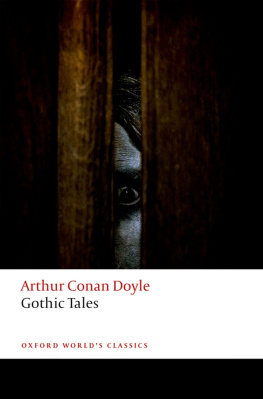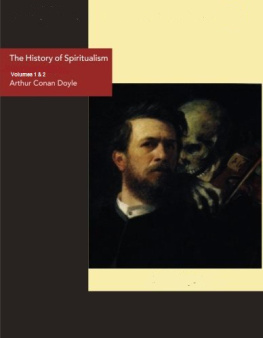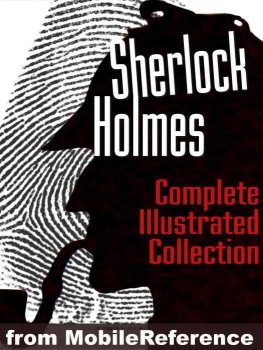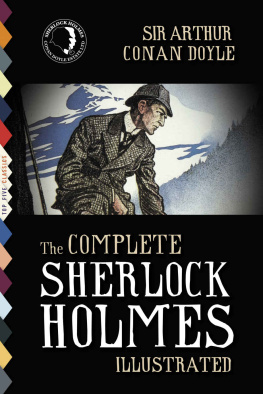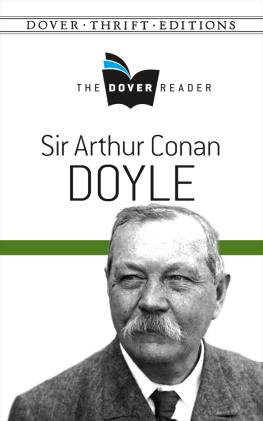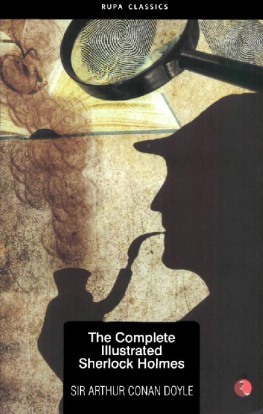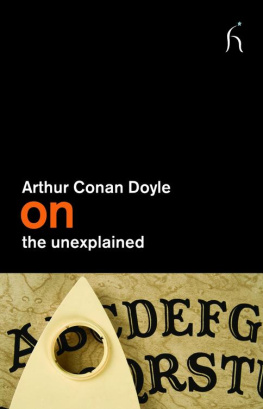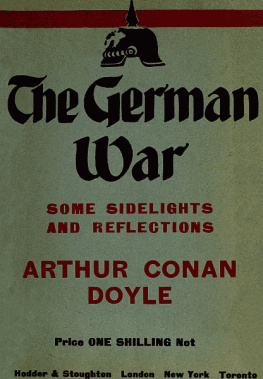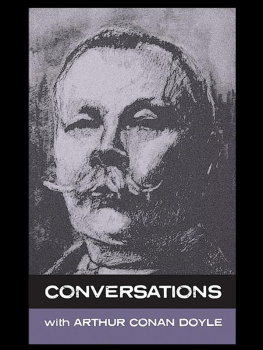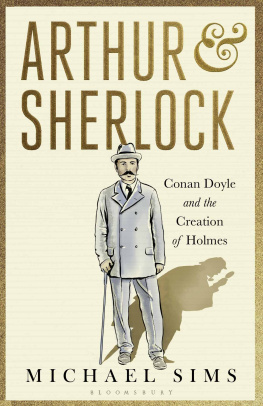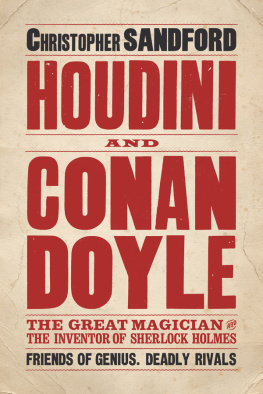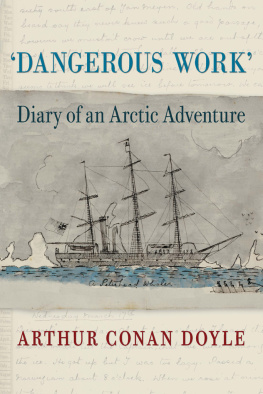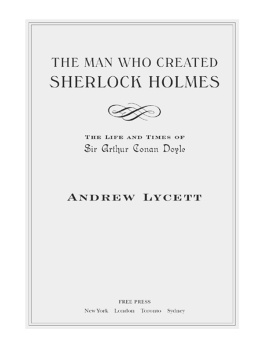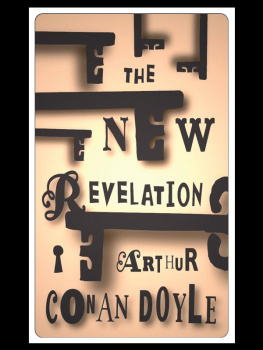Table of Contents
Landmarks
Pages

OXFORD WORLDS CLASSICS
GOTHIC TALES
S IR A RTHUR C ONAN D OYLE was born in Edinburgh in 1859 to Irish Catholic parents. He was educated at Stonyhurst, the Jesuit college, and studied medicine at Edinburgh University, graduating in 1881. He practised medicine at Southsea in the 1880s as well as in a Greenland whaler, a West African trader, and (after twenty years retirement) a Boer War hospital. His literary career began in 1879 with the publication of a short story in Chamberss Journal, and the first Sherlock Holmes adventure, A Study in Scarlet, was published in 1887. A master of short fiction, Doyle was one of the most important writers of the Gothic short stories at time when this genre was at its most important and influential. Doyles Gothic tales draw on his enormously wide range of interests, and cover the full panoply of Gothic subgenres, including medical horror, Egyptomaniac stories, ghosts, and spiritualism. He also wrote historical and colonial novels including those that revolved around Brigadier Gerard and Napoleon. He ran unsuccessfully for Parliament and became a leading public figure, as an enthusiastic cricketer, an activist against miscarriages of justice, and the foremost English publicist of spiritualism. He was knighted in 1902 and died at Crowborough, Sussex, in 1930.
D ARRYL J ONES is Professor in English at Trinity College Dublin, where he has taught since 1994. His publications include Horror: A Thematic History in Fiction and Film (2002) and Jane Austen (2004). He has edited Horror Stories: Classic Tales from Hoffmann to Hodgson (2014), and M. R. Jamess Collected Ghost Stories (2013) for Oxford Worlds Classics.
OXFORD WORLDS CLASSICS
For over 100 years Oxford Worlds Classics have brought readers closer to the worlds great literature. Now with over 700 titlesfrom the 4,000-year-old myths of Mesopotamia to the twentieth centurys greatest novelsthe series makes available lesser-known as well as celebrated writing.
The pocket-sized hardbacks of the early years contained introductions by Virginia Woolf T. S. Eliot, Graham Greene, and other literary figures which enriched the experience of reading. Today the series is recognized for its fine scholarship and reliability in texts that span world literature, drama and poetry, religion, philosophy and politics. Each edition includes perceptive commentary and essential background information to meet the changing needs of readers.
OXFORD WORLDS CLASSICS

ARTHUR CONAN DOYLE
Gothic Tales

Edited with an Introduction and Notes by
DARRYL JONES


Great Clarendon Street, Oxford, OX2 6DP , United Kingdom
Oxford University Press is a department of the University of Oxford. It furthers the Universitys objective of excellence in research, scholarship, and education by publishing worldwide. Oxford is a registered trade mark of Oxford University Press in the UK and in certain other countries
Selection and editorial matter Darryl Jones 2016
The moral rights of the author have been asserted
First published 2016
First published as an Oxford Worlds Classics paperback 2018
Impression: 1
All rights reserved. No part of this publication may be reproduced, stored in a retrieval system, or transmitted, in any form or by any means, without the prior permission in writing of Oxford University Press, or as expressly permitted by law, by licence or under terms agreed with the appropriate reprographics rights organization. Enquiries concerning reproduction outside the scope of the above should be sent to the Rights Department, Oxford University Press, at the address above
You must not circulate this work in any other form and you must impose this same condition on any acquirer
Published in the United States of America by Oxford University Press
198 Madison Avenue, New York, NY 10016, United States of America
British Library Cataloguing in Publication Data
Data available
Library of Congress Cataloging in Publication Data
Data available
ISBN 9780198734307
eBook ISBN 9780192571663
Printed in Great Britain by Clays Ltd, St Ives plc
Links to third party websites are provided by Oxford in good faith and for information only. Oxford disclaims any responsibility for the materials contained in any third party website referenced in this work.
ACKNOWLEDGEMENTS
I WOULD like to begin by thanking my editors at OUP. Judith Lunas enthusiasm for the subject, and her habitual patience and wisdom, have meant a great deal to me. My thanks also to Luciana OFlaherty for seeing the project through to completion, and for her understanding towards my cavalier attitude to the specifics of deadlines. My thanks to the librarians of the British Library and Trinity College Dublin for their help and advice.
I would also like to thank Ailise Bulfin, Con Casey, Valeria Cavalli, Clare Clarke, John Connolly, Nick Daly, Ruth Doherty, Mary Donnelly, Christine Ferguson, Laura Habbe, Kate Hebblethwaite, Douglas Kerr, Miles Link, Roger Luckhurst, Elizabeth McCarthy, Bernice Murphy, Helen Conrad OBriain, Deagln Donghile, Eve Patten, Catherine Phelps, and Conor Reid, all of whom, whether they know it or not, have helped to make this book what it is. Particular thanks go as ever to Jarlath Killeen for his friendship, knowledge, and support over many years.
This book is dedicated with love to Margaret Robson and Morgan Jones, my family.
CONTENTS
Readers who are unfamiliar with the stories may prefer to treat the Introduction as an Afterword.
A RTHUR C ONAN D OYLE is the greatest genre writer Britain has ever produced. Over the course of a long and very prolific career he earned enormous popularity and public acclaim, some degree of political influence, a knighthood, a very large amount of money, and towards the end of his life no little scorn and ridicule. He was a forceful personality: a big man, proud of his physiquestrong and active, he called himselfand a man of considerable intelligence, of boundless energy, and of unassailable self-confidence. These were qualities which he brought to bear on a variety of endeavours, but especially upon the writing of fiction, of which he produced a great amount in an astounding variety of genres.
Writers are not always the best judges of their own work. To a significant degree, Doyle owed his fame and success to the creation of Sherlock Holmes, a true literary immortal whose international celebrity and marketability show no signs of dwindling. Doyle is unquestionably one of the most important writers in the history of crime fiction. And yet Holmes was increasingly a source of irritation to his creator, who was convinced that his real talents lay elsewhere. As far as he was concerned, his lasting achievements were in the genre of historical fiction. Looking back on his career in his 1924 autobiography, Memories and Adventures, Doyle identified the fourteenth-century historical romances The White Company (1891) and Sir Nigel (1906) as the most complete, satisfying thing that I have ever done. All things find their level, but I believe that if I had never touched Holmes, who has tended to obscure my higher work, my position in literature would at the present moment be a more commanding one.

